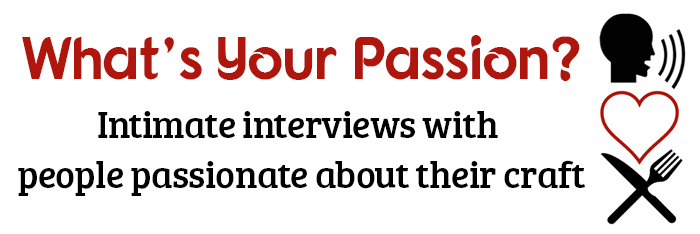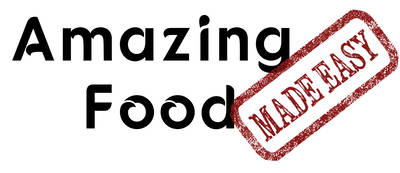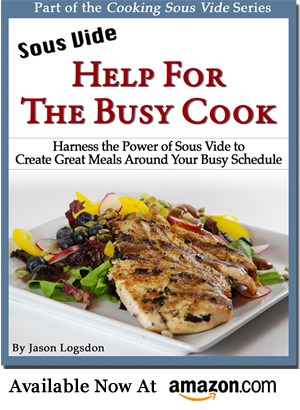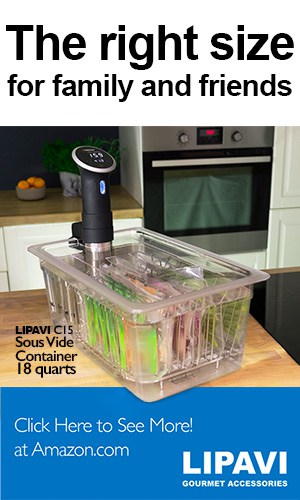-
Sous Vide Time and Temperatures
Sous Vide Time and Temps
Sous Vide Time and Temps
Sous Vide Temps
- All Sous Vide Temperatures
- Sous Vide Beef Temperatures
- Sous Vide Chicken Temperatures
- Sous Vide Duck Temperatures
- Sous Vide Fish Temperatures
- Sous Vide Vegetables Temperatures
- Sous Vide Infusions Temperatures
- Sous Vide Lamb Temperatures
- Sous Vide Pork Temperatures
- Sous Vide Shellfish Temperatures
- Sous Vide Turkey Temperatures
- Recipes Recipes Recipes Recipes
- Getting Started Guides Getting Started Guides Getting Started
- Equipment and Tools Equipment and Tools Equipment Equipment and Tools
- More Resources More Resources Resources More Resources

This article is a part of my What's Your Passion? interview series, providing intimate interviews with people passionate about their craft. Is there someone you'd like me to interview, or are you passionate about a certain craft? Please let me know!
Brian Thurber from Proud Pour
More What's Your Passion?
•
Interviews • What's Your Passion
Click here to get great sous vide content via email
This post may contain affiliate links. Read more.
Written by Jason Logsdon
Brian Thurber is the Co-CEO of Proud Pour, a wine creator with a huge focus on giving back to help build up the environment. I ran into Brian at Food Loves Tech in Brooklyn and he agreed to answer a few questions for me! I can also attest that their wine is really good! You can get your own bottle here.

Jason: Proceeds from each bottle of wine you sell through Proud Pour goes to support a specific conservation effort. What made you decide to start a business combining wine and environmental causes?

Brian Thurber: All credit to my business partner Berlin Kelly. She founded Proud Pour in 2014 in New York City where she was working in finance and spending her free time fermenting cider, wine, beer, mead, and kombucha with the New York City Homebrewers Guild. She made the connection between wine and conservation when she went to a screening of Shellshocked, a documentary about the history of oysters in New York.
After the screening there was a Q&A with the founders of the Billion Oyster Project, a wonderful organization working to restore NY Harbor's ecosystem by restoring its keystone species, the oyster. It all clicked for her: she would create a Sauvignon Blanc to pair with sustainable farmed oysters and then use the sales to support wild oyster reef restoration. (By the way, almost 100% of what you eat at the raw bar these days is farmed oysters, which are sustainable to eat, and the shells from those oysters can be collected and put back in the water to kickstart a new wild oyster reef ecosystem.)
Over the last four years we've come to see that wine is a powerful way to reach people with environmental messages. A bottle of wine is something you share with friends and family, and our bottle starts a conversation about the environment and why it matters. If you show up to a party with one of our wines, someone will ask about it.

Jason: You currently sell a Sauvignon Blanc to restore wild oyster reefs, and a Pinot Noir to plant wildflowers to create habitats for bees. How do these support efforts work?
Brian Thurber: I have a background in the environmental nonprofit world, and we've built up relationships now with 18 wonderful, science-based environmental organizations that are doing the restoration work. We make impact-based donations to our partners to do additional, measurable restoration - 100 wild oysters restored for each bottle of the Sauvignon Blanc and 90 sq. ft. of wildflower habitat planted for bees for each bottle of the Pinot Noir.
We deliberately aren't a percentage-of-profits company, because what if we had a bad sales year or threw some great party at the end of the year? Then the Earth and our amazing partner organizations would lose out. Instead, we bake the donation into every bottle, so we pay for the work regardless of whether we sell a bottle or use it as a sample bottle. We treat the restoration as part of our cost of goods sold.

Jason: I understand that you try to support projects in the region the wine is purchased, instead of just supporting national organizations. Can you talk about how you accomplish that and find local partners?
Brian Thurber: As much as possible we want to connect people with local environmental restoration. Everyone should know about critical local work that impacts their coastline or local farms. It gives them an opportunity to get involved with the work, meet like-minded people, or attend a local environmental fundraiser.
We started selling three years ago supporting one partner group, and now we're in double digits. All that comes from slowly building trust over time. In both the oyster and bee worlds people know each other and will vouch for us. One of our partner groups let us know that last year our donations represented 40% of their oyster restoration budget. It made us really happy to know we could make a big impact for them.
Jason: There are many different goals in wine-making, from bottles sold for hundreds of dollars for connoisseurs' palates to more affordable "everyday" drinking wines. I really enjoyed both your Pinot Noir and Sauvignon Blanc and I was wondering what do you aim to achieve with your wine choices?
Brian Thurber: Absolutely! It's a huge world out there with wine. We have three goals with our wines. First is to work with growers and winemakers who care about the Earth. Our wines are organic or sustainable-certified, and in the future we want to be a market maker for the most aggressively sustainable growers on the planet. Think about the impact that a big player like Whole Foods has on the market when they let growers know they want more organically-grown tomatoes, for example (setting aside for a moment the issues with massive organic monoculture). We want to have that scale of impact in the alcohol industry.
Second, the wines have to be excellent. Proud Pour is not about a compromise where you buy the wine even if you don't really love it. No, our mission is pure celebration. You get to drink well, help the Earth, and feel good!
Third, we aim for our wines to be under $20 on the shelf. Environmental protection shouldn't be a luxury when it affects all of us. We want to be accessible to people who don't have the means to buy expensive wines.
Jason: What is next for Proud Pour? Is there a conservation effort you are eyeing for your next project? Or another varietal of wine - or maybe some other drink - you are looking to try?

Brian Thurber: We've got some fun stuff in the works, and we've just started hunting for our first investor to help us scale up. Later this year we'll release our Whiskey for Wolves, which is our first foray into spirits. And in 2019 we'll release our beer for sea turtles and a rosé and a sparkling wine for oysters. You can probably imagine that we are always dreaming of dozens of other critical species and ecosystems that could use a delicious drink behind them. We plan to keep growing to play our part in supporting all the wonderful environmental work out there and and to celebrate all the bounty this beautiful Earth gives us.
Jason: Thanks so much for your time Brian. And everyone remember you can get your own bottle today!
Is there someone you know that I should interview for What's Your Passion? Have any follow up questions you want answered? Let me know in the comments.
 This article is by me, Jason Logsdon. I'm an adventurous home cook and professional blogger who loves to try new things, especially when it comes to cooking. I've explored everything from sous vide and whipping siphons to pressure cookers and blow torches; created foams, gels and spheres; made barrel aged cocktails and brewed beer. I have also written 10 cookbooks on modernist cooking and sous vide and I run the AmazingFoodMadeEasy.com website.
This article is by me, Jason Logsdon. I'm an adventurous home cook and professional blogger who loves to try new things, especially when it comes to cooking. I've explored everything from sous vide and whipping siphons to pressure cookers and blow torches; created foams, gels and spheres; made barrel aged cocktails and brewed beer. I have also written 10 cookbooks on modernist cooking and sous vide and I run the AmazingFoodMadeEasy.com website.
Affiliate Disclaimer: Some links on this site might be affiliate links that if used to purchased products I might receive money. I like money but I will not endorse something I don't believe in. Please feel free to directly go to any products I link to and bypass the referral link if you feel uncomfortable with me receiving funds.













